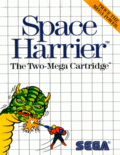
































Space Harrier

Space Harrier is a third-person arcade rail shooter game developed by Sega and released in 1985. Originally conceived as a realistic military-themed game played in the third-person perspective and featuring a player-controlled fighter jet, technical and memory restrictions resulted in Sega developer Yu Suzuki redesigning it around a jet-propelled human character in a fantasy setting. The arcade game is controlled by an analog flight stick while the deluxe arcade cabinet is a cockpit-style hydraulic motion simulator cabinet that tilts and rolls during play, for which it is referred as a taikan ('body sensation') arcade game in Japan.
It was a commercial success in arcades, becoming one of Japan's top two highest-grossing upright/cockpit arcade games of 1986 (along with Sega's Hang-On). Critically praised for its innovative graphics, gameplay and motion cabinet, Space Harrier is often ranked among Suzuki's best works. It has made several crossover appearances in other Sega titles, while Capcom and PlatinumGames director Hideki Kamiya cited it as an inspiration for his entering the video game industry.
Space Harrier has been ported to over twenty different home computer and gaming platforms, either by Sega or outside developers such as Dempa in Japan and Elite Systems in North America and Europe. Two home-system sequels followed in Space Harrier 3-D and Space Harrier II (both released in 1988), and the arcade spin-off Planet Harriers (2000). A polygon-based remake of the original game was released by Sega for the PlayStation 2 as part of their Sega Ages series in 2003.
Space Harrier is a fast-paced rail shooter game played in a third-person perspective behind the protagonist, set in a surreal world composed of brightly colored landscapes adorned with checkerboard-style grounds and stationary objects such as trees or stone pillars. At the start of gameplay, players are greeted with a voice sample speaking 'Welcome to the Fantasy Zone. Get ready!', in addition to 'You're doing great!' with the successful completion of a stage. The title player character, simply named Harrier, navigates a continuous series of eighteen distinct stages while utilizing an underarm jet-propelled laser cannon that enables Harrier to simultaneously fly and shoot. The objective is simply to destroy all enemies—who range from prehistoric animals and Chinese dragons to flying robots, airborne geometric objects and alien pods—all while remaining in constant motion in order to dodge projectiles and immovable ground obstacles.
Fifteen of the game's eighteen stages contain a boss at the end that must be killed in order to progress to the next level; the final stage is a rush of seven past bosses encountered up to that point that appear individually and are identified by name on the bottom of the screen. The two other levels are bonus stages that contain no enemies and where Harrier mounts an invincible catlike dragon named Uriah, whom the player maneuvers to smash through landscape obstacles and collect bonus points. After all lives are lost, players have the option of continuing gameplay with the insertion of an extra coin. As Space Harrier has no storyline, after the completion of all stages, only 'The End' is displayed before the game returns to the title screen and attract mode, regardless of how many of the player's extra lives remain.
How to play:
Click on the joystick icon in the Space Harrier online emulator to see how to control the Space Harrier game









































Comments